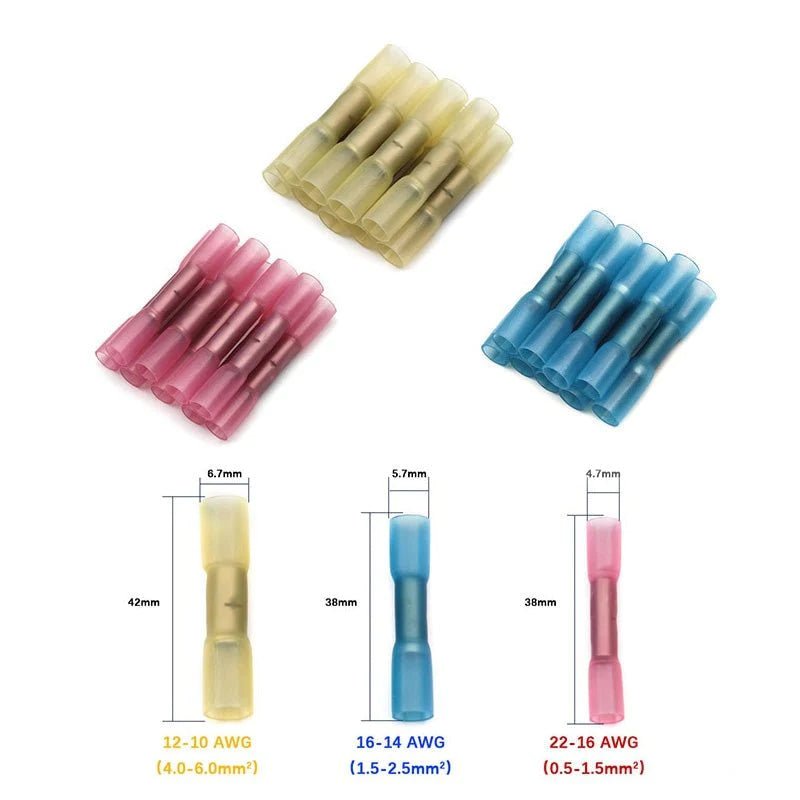
Bullet Connectors vs. Butt Connectors: Which is Best for Your Project?
Bullet Connectors: A Quick Overview
Bullet connectors, also known as bullet terminals, are cylindrical connectors with a male and a female end. They are widely used in automotive, marine, and other electrical applications. These connectors are available in various sizes and materials, including metal and plastic, to suit different needs.
Advantages of Bullet Connectors
- Quick and Easy Connection: Bullet connectors are designed for quick and easy connections, making them a popular choice in automotive and other applications where regular disconnections are required.
- Reusability: They can be disconnected and reconnected multiple times without significant wear and tear, which makes them a cost-effective choice for some projects.
- Visible Connection: The exposed connection can be visually inspected for quality and security, which is essential in applications where safety is a concern.
- Available in Various Sizes: Bullet connectors come in a range of sizes, allowing you to choose the right size for your specific wiring needs.
Disadvantages of Bullet Connectors
- Not Always Waterproof: Most bullet connectors are not inherently waterproof, which limits their use in applications where moisture or immersion is a concern.
- Limited Contact Area: The contact area in bullet connectors can be relatively small, which may lead to higher resistance and heat generation in high-current applications.
Butt Connectors: A Quick Overview
Butt connectors, also known as splice connectors, are cylindrical or tubular connectors used to join two wires or cables end-to-end. They are typically used in permanent or semi-permanent connections in various electrical and wiring applications.Advantages of Butt Connectors
- Secure and Reliable: Butt connectors offer a secure and reliable connection, making them a suitable choice for applications where a strong and permanent joint is required.
- Wide Range of Sizes: Just like bullet connectors, butt connectors come in various sizes to accommodate different wire gauges, ensuring a proper fit for your project.
- Waterproof Variants Available: Butt connectors with heat-shrink insulation can be used in waterproof applications, providing protection against moisture and environmental factors.
- Increased Contact Area: The contact area in butt connectors is larger, reducing resistance and heat generation in high-current applications.
- Not as Convenient for Repeated Disconnections: Butt connectors are not designed for frequent disconnections and reconnections, as they are typically used in more permanent installations.
- Less Visible Connection: Once secured, butt connectors create a less visible connection, which can make it challenging to visually inspect the connection for quality.
Choosing the Right Connector for Your Project
The choice between bullet connectors and butt connectors primarily depends on the specific requirements of your project. Here are some factors to consider when making your decision:
- Nature of the Project
For permanent or semi-permanent connections, butt connectors are ideal for their durability and reliability.
- Environment and Weather Conditions
- Wire Gauge
- Current Rating
- Visual Inspection
If visual inspection is essential for your project, such as in safety-critical applications, bullet connectors may be preferred as they provide a more visible connection.
The Importance of Waterproof Wire Connectors
In many electrical and wiring projects, ensuring water resistance is crucial. Moisture and environmental factors can lead to corrosion, short circuits, and other electrical issues. To combat these problems, waterproof wire connectors play a vital role.Waterproof wire connectors are designed to create a seal around the connection, preventing moisture from entering and causing damage. These connectors are commonly used in outdoor lighting, marine applications, underground wiring, and other situations where exposure to water is a concern.
One popular type of waterproof wire connector is the heat-shrink butt connector. It features a heat-shrinkable insulation that, when heated, forms a tight seal around the connection, making it impervious to water. This type of connector is an excellent choice for outdoor and marine projects where moisture resistance is crucial.
Conclusion
In the battle of bullet connectors vs. butt connectors, there is no one-size-fits-all answer. The best connector for your project depends on factors like the project's nature, environmental conditions, wire gauge, and current requirements. Bullet connectors excel in situations that require frequent disconnections, while butt connectors are ideal for permanent or semi-permanent connections, especially in high-current applications.
Moreover, when dealing with applications exposed to moisture and water, opting for waterproof wire connectors is a wise decision. Heat-shrink butt connectors, which provide water resistance while maintaining a reliable electrical connection, are an excellent choice for these scenarios.
